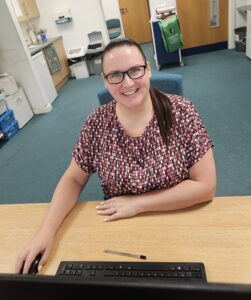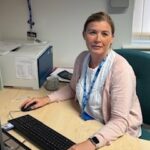New Ways of Working at Hillside Practice, Skelton, Cleveland
Starting the Change
At Hillside Practice in Skelton, Cleveland a commitment to improving patient access and staff wellbeing has driven a series of transformative changes. The adoption of a new digital telephone system and the practice’s participation in the General Practice Improvement Programme (GPIP) have been key to this level of change.
GPIP is a national NHS England initiative designed to help GP practices improve patient access, reduce workload, and modernise their systems. It offers structured support, including data analysis, leadership coaching, and process redesign, to help practices implement sustainable changes. Practices can use the programme to streamline operations, enhance care navigation, and create calmer, more efficient working environments.
Battling the bottlenecks

Claire Howard
The team recognised that the traditional 8:00 AM rush was creating bottlenecks and stress for both patients and staff. By analysing call data, they identified key pressure points and implemented targeted solutions. As Claire Howard, Office Supervisor at Hillside explained:
“We used the data to create heat maps which showed us where our pressure points were. In the morning there was a big block of red…We realised people were calling multiple times from multiple lines. We created a directory of services to let our patients know all the options available to them, from Pharmacy First to mental health and physio. People are having good experiences and are happy to cut out the middleman.”
The introduction of a call-back function, revised staff rotas, and dedicated phone lines for specific queries helped to reduce call congestion and improve the patient experience. These changes were supported by a robust care navigation system and a locally developed Directory of Services (DOS), empowering reception staff to direct patients to the most appropriate care from the moment they made contact.
Claire added:
“We introduced some extra lines on our telephone system so that not all patients were coming through to one line. We now have a prescriptions line plus a test results and general queries line and that only opens at 2 o’clock on an afternoon. This means that the phones aren’t getting clogged up with calls first thing.
“We’ve opened up our contact methods – we offer e-consultation but we also still have patients who present at the practice. We have patients who ring up for appointments. What this is offering is an equality of service to our patients, because no matter how they present to the surgery, they’re all triaged in the same way.”
Realising the Benefits for Patients and Staff
The impact of these changes has been significant. Patients now benefit from shorter wait times, more personalised care, and greater awareness of the range of services available to them. The call-back feature has been especially well received, allowing patients to avoid long hold times and continue with their day while waiting for a return call.
There were a few bumps in the road but the practice worked hard to resolve them. Rachael Alderson, the practice’s Operations Manager, looks back at the challenges the team faced: She says:
“I think at first the main challenge that we had was helping patients realise that it isn’t always a GP that they need to see and that they might not actually be the most appropriate person for their care.
“We used social media and we’ve got notice boards all around the surgery. But a lot of it was training the staff to give them the confidence to give the patients the correct information. This reassured our patients and gradually it is getting better.”
Staff morale has also improved. The practice introduced quarterly “niggles boards” to surface and resolve everyday frustrations, leading to quick wins like replacing their headsets and improving communication. These sessions, extended to include the GP partners at the practice, helped foster a more cohesive and supportive team environment.
The GPIP programme played a pivotal role in enabling these improvements. It provided the structure, time, and external facilitation needed to reflect on existing processes and implement meaningful change. While the programme was demanding, it brought the administrative team closer together and gave them the confidence to challenge and improve long-standing practices.
Rachael added: “It made us stop, think, and work together. We were ahead of the game, and that meant we were always being asked to do more – but it was worth it.”
Ideas for the Future
Looking ahead, Hillside Practice is committed to building on its progress. Plans include continuing to refine care navigation, expanding the use of digital tools, and maintaining strong links with local services like pharmacies and mental health providers. The team also hopes sharing their positive experience and outcomes will help others navigate the challenges that come with implementing modern systems.
Claire sums it up as follows:
“It’s easy to get so bogged down in your workload that you don’t take the time away to look at the bigger picture. Our facilitator was fantastic and made us look at all sorts of different processes that you probably wouldn’t normally look at, including how we were care-navigating.
“Now we have simpler and more streamlined processes in place, and this has improved access and equality of service to patients.”
The practice’s experience highlights the importance of listening to both patients and staff, using data to drive decisions, and embracing change – even when it’s difficult. Their journey offers a powerful example of how practice-level innovation, supported by programmes like GPIP, can lead to better outcomes for both practices and their patients.
For more information about Modern General Practice and the support available visit NHS England » Modern general practice model

Rachael Alderson
